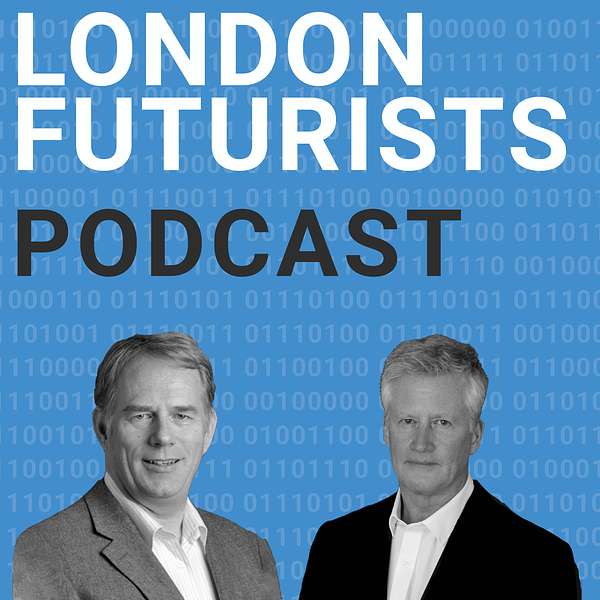
London Futurists
Anticipating and managing exponential impact - hosts David Wood and Calum Chace
Calum Chace is a sought-after keynote speaker and best-selling writer on artificial intelligence. He focuses on the medium- and long-term impact of AI on all of us, our societies and our economies. He advises companies and governments on AI policy.
His non-fiction books on AI are Surviving AI, about superintelligence, and The Economic Singularity, about the future of jobs. Both are now in their third editions.
He also wrote Pandora's Brain and Pandora’s Oracle, a pair of techno-thrillers about the first superintelligence. He is a regular contributor to magazines, newspapers, and radio.
In the last decade, Calum has given over 150 talks in 20 countries on six continents. Videos of his talks, and lots of other materials are available at https://calumchace.com/.
He is co-founder of a think tank focused on the future of jobs, called the Economic Singularity Foundation. The Foundation has published Stories from 2045, a collection of short stories written by its members.
Before becoming a full-time writer and speaker, Calum had a 30-year career in journalism and in business, as a marketer, a strategy consultant and a CEO. He studied philosophy, politics, and economics at Oxford University, which confirmed his suspicion that science fiction is actually philosophy in fancy dress.
David Wood is Chair of London Futurists, and is the author or lead editor of twelve books about the future, including The Singularity Principles, Vital Foresight, The Abolition of Aging, Smartphones and Beyond, and Sustainable Superabundance.
He is also principal of the independent futurist consultancy and publisher Delta Wisdom, executive director of the Longevity Escape Velocity (LEV) Foundation, Foresight Advisor at SingularityNET, and a board director at the IEET (Institute for Ethics and Emerging Technologies). He regularly gives keynote talks around the world on how to prepare for radical disruption. See https://deltawisdom.com/.
As a pioneer of the mobile computing and smartphone industry, he co-founded Symbian in 1998. By 2012, software written by his teams had been included as the operating system on 500 million smartphones.
From 2010 to 2013, he was Technology Planning Lead (CTO) of Accenture Mobility, where he also co-led Accenture’s Mobility Health business initiative.
Has an MA in Mathematics from Cambridge, where he also undertook doctoral research in the Philosophy of Science, and a DSc from the University of Westminster.
London Futurists
AI overview: 1. From the Greeks to the Big Bang
AI is a subject that we will all benefit from understanding better. In this episode, co-hosts Calum Chace and David Wood review progress in AI from the Greeks to the 2012 "Big Bang".
00.05: A prediction
01.09: AI is likely to cause two singularities in this pivotal century - a jobless economy, and superintelligence
02.22: Counterpoint: it may require AGI to displace most people from the workforce. So only one singularity?
03.27: Jobs are nowhere near all that matters in humans
04.11: Are the "Three Cs jobs" safe? Those involving Creativity, Compassion, and Commonsense? Probably not.
05.15: 2012, the Big Bang in AI
05.48: AI now makes money. Google and Facebook ate Rupert Murdoch's lunch
06.30: AI might make the difference between military success and military failure. So there's a geopolitical race as well as a commercial race
07.18: Defining AI.
09.03: Intelligence vs Consciousness
10.15: Does the Turing Test test for Intelligence or Consciousness?
12.30: Can customer service agents pass the Turing Test?
13.07: Attributing consciousness by brain architecture or by behaviour
15.13: Creativity. Move 37 in game two of AlphaGo vs Lee Sedol, and Hassabis' three buckets of creativity
17.13: Music and art produced by AI as examples
19.05: History: Start with the Greeks, Hephaestus (Vulcan to the Romans) built automata, and Aristotle speculated about technological unemployment
19.58: AI has featured in science fiction from the beginning, eg Mary Shelley's Frankenstein, Samuel Butler's Erewhon, E.M. Forster's "The Machine Stops"
20.55: Post-WW2 developments. Conference in Paris in 1951 on "Computing machines and human thought". Norbert Weiner and cybernetics
22.48: The Dartmouth Conference
23.55: Perceptrons - very simple models of the human brain
25.13: Perceptrons debunked by Minsky and Papert, so Symbolic AI takes over
25.49: This debunking was a mistake. More data and better hardware overcomes the hurdles
27.20: Two AI winters, when research funding dries up
28.07: David was taught maths at Cambridge by James Lighthill, author of the report which helped cause the first AI winter
28.58: The Japanese 5th generation computing project under-delivered in the 1980s. But it prompted an AI revival, and its ambitions have been realised by more recent advances
30.45: No more AI winters?
Music: Spike Protein, by Koi Discovery, available under CC0 1.0 Public Domain Declaration
For more about the podcast hosts, see https://calumchace.com/ and https://dw2blog.com/
Elevate how you lead with insight from today’s most influential executives.
Listen on: Apple Podcasts Spotify

